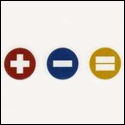|
h_double posted:When I was a little kid, I used to get a piece of cardboard and draw these big panels full of knobs and switches and readouts. I thought I was playing spaceships, but deep down inside I knew what was up. I can't tell whether you're serious, but I find it a fascinating subject and I wasn't really kidding. The first album to make me hear music as something that was constructed from various elements was KLF's The White Room and it's still in my personal album top 5. The liner notes said it was made on an Amiga computer! And I had a computer!
|
|
|
|

|
| # ? May 22, 2024 16:23 |
|
Flipperwaldt posted:Or is it the other way around and are you now still playing spaceships on your synths? I dunno, I think it kind of goes both ways, there's a general fascination with gadgets and technology, but I also think making music allows me another kind of imaginative sandbox to hang out in. Flipperwaldt posted:The first album to make me hear music as something that was constructed from various elements was KLF's The White Room and it's still in my personal album top 5. The liner notes said it was made on an Amiga computer! And I had a computer! That album is incredible. Musically it's ferocious, and the whole thing is just so wonderfully OUT THERE without coming off as "wacky" or "ironic". For me, the first thing to really get me thinking about the potential of making electronic music was the Atari 800 I had as a kid, there was a demo with a pretty decent chiptune rendition of Jean-Michel Jarre's "Oxygene" and "Equinoxe". I'd heard and loved the stuff Giorgio Moroder was doing back then (like the Blondie song "Call Me") and it was amazing hearing that great step sequencer sound on my dinky little home computer. A couple of years later I got an Atari ST (which had built in MIDI ports) and a CZ-1000. I loved finding MIDI files of stuff like Bach and Chopin, all this mathematically wonderful music, and being able to screw around with the instrumentation in realtime. A couple years after THAT, around 1992, I discovered the KLF and The Orb and Throbbing Gristle, got a cassette 4-track, and it was officially 
|
|
|
|
Slapped this together today. For Hiphop instrumentals I think this is a little better than what I normally am capable of, chalk it up to luck. https://soundcloud.com/winemouth/cambridge-grime Also I missed a bunch of posts in this thread and it's hard to keep up with who everyone is one here and on SoundCloud but I'm probably more likely to leave you a comment there.
|
|
|
|
h_double posted:I dunno, I think it kind of goes both ways, there's a general fascination with gadgets and technology, but I also think making music allows me another kind of imaginative sandbox to hang out in. h_double posted:For me, the first thing to really get me thinking about the potential of making electronic music was the Atari 800 I had as a kid, there was a demo with a pretty decent chiptune rendition of Jean-Michel Jarre's "Oxygene" and "Equinoxe". I'd heard and loved the stuff Giorgio Moroder was doing back then (like the Blondie song "Call Me") and it was amazing hearing that great step sequencer sound on my dinky little home computer. A couple of years later I got an Atari ST (which had built in MIDI ports) and a CZ-1000. I loved finding MIDI files of stuff like Bach and Chopin, all this mathematically wonderful music, and being able to screw around with the instrumentation in realtime. 
|
|
|
|
Flipperwaldt posted:
I'm the same, I'll work on something for an hour or two, think 'So THAT'S how I make that sound!' then close it without saving anything. In a way, this probably comes from my guitar/bass background where there's no saves, only my memory and maybe some scribbled pedal settings. Likewise on the whole over-analyzing music thing, it's gotten to a point where if I don't like the way and album/track sounds, even if the songwriting is fantastic, I can't enjoy it fully; Once I've noticed a vocal is clipping or the bass is muddy, thats all I can hear. It sucks.
|
|
|
|
I've been putting serious hours into my productions for only maybe a year and a half now, but the process has been similar to how Flipperwaldt has explained his. I tried to master a few plugins and instruments that I thought were essential, unfortunately (maybe fortunately, too) now that I have a pretty well established workflow to the point where I can put whatever's in my brain onto paper, so to speak, I have created relatively high standards for myself when I'm experimenting with new plugins so I'm very quick to throw things out or just stop using them when they may have untapped capabilities in favor of something more familiar that I know will do a particular job. This may also be limiting, but I feel like my creative process, my influences, and just the way I want something to sound take me on a more linear path than what plugins I'm using. It may have been posted in this thread already, but I found this e-book by Tom Cosm http://www.cosm.co.nz/index.php?option=com_content&view=article&id=325 pretty handy, actually, although the only snippet that still stands out to me is from Zen Mechanics, (ZM also happens to be one of my favourite producers https://soundcloud.com/zenmechanics/sonic-species-drums-at-dawn)he basically says that if a track isn't finished within two weeks he'll throw it out. I don't follow this as gospel, but it has helped me break some of my more retarded perfectionist habits, mainly the habit of, surprise surprise, not finishing tracks. I apply the same logic to parts of tracks, I no longer try to fit things into holes they don't belong in and while most of what I do comes from aimlessly mucking around without any real structure, I have to be disciplined with what I consider a productive experiment or a waste of time. I think that it isn't worth denying how easy and quick it is to lay down a track on a computer IF the idea is there, I used to listen to metal and I used to think that an album must sound better because it took 10 years to record, but now I place so much more value on mucking around on something, experimenting, throwing it out and then taking that on to the next attempt where your understanding of the fundamentals will be better. This way I think you just keep improving and creative ideas flow more easily rather than spending your whole life tweaking one single idea. Having said all of this, I still spend way too long on some tracks, but I'm good at identifying a point at which my ears are useless and I need a second opinion, or I need to move on. I don't think churning tracks out every two weeks is damning of any genre or style of music either, considering the level of complexity you can achieve in a short amount of time with a sequencer, and an idea doesn't take 10 years to develop most of the time. Here's something I've been working on over the last couple of days, I'm not completely happy with the bass and I still feel like it's too muddy in parts, but I feel really good about how the whole process went on this one, I started it on Thursday, played version 1.0 out on Friday which was awesome and polished it up heaps on Saturday. https://soundcloud.com/doppelau/stoned-love I'm also at a point where I'm way too analytic when I go to a gig, and I spend most of the time I used to spend locked in my headphones listening to music just working on my own tunes, but I think awareness of that fact is important. I'm genuinely curious about how other people run their live shows and most of the music I go to see live is generally made by people who I think are really badarse so while there is usually too much analysis, I feel like it gives me a greater appreciation, although I did see Hallucinogen live once, he had a live drummer and while I thought it was kind of cool he was implementing live drums into his music played off CDs, the drummer just wasn't as tight as a computer even though he was pretty good so it just bothered me the whole time. When I go to a club and there's someone completely shocking on the 1s and 2s, that really gets me, I don't think that's a disease however. lazer bullet fucked around with this message at 09:17 on May 19, 2013 |
|
|
|
lazer bullet posted:I don't think churning tracks out every two weeks is damning of any genre or style of music either, considering the level of complexity you can achieve in a short amount of time with a sequencer, and an idea doesn't take 10 years to develop most of the time. I recently learned that the Miles Davis album "Kind of Blue", often considered the greatest jazz album ever, was recorded in just seven hours -- every track except one was a first take. Naturally, that doesn't take into account the many thousands of hours those musicians spent developing their talent, but it's a similar thing; once you know what you're doing and are confident of your abilities, trust your instincts and don't get caught up on every little detail. Your first impulses are usually correct, don't overthink everything. I'm sure the mixing and engineering of "Kind of Blue" took a whole lot of hours, and electronic music is a little unusual in that there is no hard boundary between composition, performance, and engineering. There's usually a kind of back-and-forth, but for example don't spend hours getting the perfect EQ on a kick drum when you don't even have the rest of the track finished as a reference point. Once you've got a more-or-less complete six minutes of music, you'll have a lot more incentive (and information) to go back and polish up the details. Also please don't ever throw anything out! Every so often I like to go back and listen to my accumulated unfinished sketches from 6 months or 2 years back, a lot of times I will find a riff or sound that jumps out and turns into a full track, and even if there's no direct ideas, it usually gets the wheels turning like "oh yeah, I was listening to lots of <whatever> last year, I should revisit some of that". lazer bullet posted:I did see Hallucinogen live once, he had a live drummer and while I thought it was kind of cool he was implementing live drums into his music played off CDs, the drummer just wasn't as tight as a computer even though he was pretty good so it just bothered me the whole time. Live drummers in an electronic set is hard to pull off, because if they have to fit in with prerecorded drums, there's hardly any room for them to develop a groove; it prevents them from fully doing their job.
|
|
|
|
lazer bullet posted:Here's something I've been working on over the last couple of days, I'm not completely happy with the bass and I still feel like it's too muddy in parts, but I feel really good about how the whole process went on this one, I started it on Thursday, played version 1.0 out on Friday which was awesome and polished it up heaps on Saturday. https://soundcloud.com/doppelau/stoned-love I'm not up to date on my references, but would you say you've taken some cues from Trentemøller as far as the production is concerned? It sort of reminds me of that, although you use a more pleasant moderation when it comes to limiting. h_double posted:Also please don't ever throw anything out! Every so often I like to go back and listen to my accumulated unfinished sketches from 6 months or 2 years back, a lot of times I will find a riff or sound that jumps out and turns into a full track, and even if there's no direct ideas, it usually gets the wheels turning like "oh yeah, I was listening to lots of <whatever> last year, I should revisit some of that". At least, that's what I think the point is. lazer bullet posted:I don't think that's a disease however. If you can keep from crossing that line, it's an absolute gift to be able to hear what exactly you like and don't like about music.
|
|
|
|
h_double posted:For me, the first thing to really get me thinking about the potential of making electronic music was the Atari 800 I had as a kid, there was a demo with a pretty decent chiptune rendition of Jean-Michel Jarre's "Oxygene" and "Equinoxe". I'd heard and loved the stuff Giorgio Moroder was doing back then (like the Blondie song "Call Me") and it was amazing hearing that great step sequencer sound on my dinky little home computer. A couple of years later I got an Atari ST (which had built in MIDI ports) and a CZ-1000. I loved finding MIDI files of stuff like Bach and Chopin, all this mathematically wonderful music, and being able to screw around with the instrumentation in realtime. When I was ready to buy my first synth, my choice was between a DX-7, an Alpha Juno 1, and the CZ-1000. I ended up with the Juno and became a Roland acolyte from that point on. On the ST I used Dr.T's KCS and Omega, and scored a used Tascam 4-track reel-to-reel. Oy. I was so drat productive back then.
|
|
|
|
I am a music production newbie but I have always been really interested in creating beats and mixes. All of my experience comes from watching friends who know far more than I do. I do have a background in music having played guitar for about 10 years now. That being said, I would like to get started in producing electronic music with an emphasis on house/electro and was looking for some advice on equipment/software. I don't want to spend a lot of money on software since I already am planning on purchasing a laptop (looking at a Lenovo ThinkPad but am not sure if that is the right choice for music production). Any recommendations or suggestions on affordable software would be much appreciated. I was leaning towards Ableton or FL Studio because a couple friends could help me out with the basics on them. Also, if there are any trial versions out there where I could demo the functionality, that would be really helpful so I don't spend money on something I am not comfortable with. From reading several pages of this thread, I feel like a common theme for people just getting started is to watch as many demos of the software as possible, which I plan on doing. Any other entry level advice would be much appreciated!
|
|
|
|
MrSargent posted:I am a music production newbie but I have always been really interested in creating beats and mixes. All of my experience comes from watching friends who know far more than I do. I do have a background in music having played guitar for about 10 years now. That being said, I would like to get started in producing electronic music with an emphasis on house/electro and was looking for some advice on equipment/software. There are trial versions of both Ableton Live and FL Studio, I think the Live demo is fully functional for 30 days, while FL Studio has no timeout but you can't reload saved projects. Also, if you're shopping for a new computer for music production, I would advise you to seriously consider a Mac. Driver support for audio stuff tends to be more solid (in good part because the Mac hardware is more of a known target, there aren't a zillion different motherboard variations to account for), and there's better audio support built into the core OS (e.g. CoreAudio/CoreMIDI)
|
|
|
|
h_double posted:There are trial versions of both Ableton Live and FL Studio, I think the Live demo is fully functional for 30 days, while FL Studio has no timeout but you can't reload saved projects. Hmm, I have just always been a PC guy and never considered getting a Mac, but if the benefits far outweigh my preference, I could look into a Macbook Pro. My co-worker said he has one lying around that is about 3 years old so that could be a great start for a reasonable price. Also, if I go the Macbook route, my friend used Logic to do his first few remixes and it worked great for him. Would that be a good way to go?
|
|
|
|
h_double posted:There are trial versions of both Ableton Live and FL Studio, I think the Live demo is fully functional for 30 days, while FL Studio has no timeout but you can't reload saved projects. Not to discount anything h_double mentioned, but for me, the cost difference of a Mac versus a comparably equipped PC (I should specify: I'm talking laptops here) weighed in favor of the PC for me. Granted, there are things you'd get now on a Mac you can't easily get on a PC laptop (e.g. Retina display); that wasn't the case when I last compared, and I still don't think I personally care enough about those things. When I say cost difference, I'm specifically including the cost of replacement as well. Yes, you can get AppleCare, and I've had good experiences with it in the past, but sometimes you're left waiting. I bought a loaded Lenovo laptop about two years ago, with a number of end-of-year discounts applied, for less than $1k. I can replace the battery, hard drives, and memory without needing to AppleCare it or get it to an Apple Authorized Service Center. These concerns may not matter for you, but they mattered to me. As for audio stuff, again, not to discount what h_double says about audio reliability on OS X above relative in a general sense to Windows, but I've not had major audio issues that were Windows problems (I have had Live, et al. crash, etc.; the usual stuff). I do think you will probably have to know more about Windows and how to troubleshoot things, including drivers, and configure things, than is typically necessary in OS X. If you already know that stuff and feel OK about it, I'd say it's no additional hassle than to just working in Windows. If you're willing to pay the cost difference for the benefit of (hopefully) not needing to worry about it, have at it.
|
|
|
|
mnd posted:LI can replace the battery, hard drives, and memory without needing to AppleCare it or get it to an Apple Authorized Service Center. These concerns may not matter for you, but they mattered to me. Just to clarify you can switch out the hardware you mentioned on your own on a Mac just as easily or more easily than on a PC, you literally just pop the battery off and slide the new hardware in.
|
|
|
|
That's all you can replace though. Also the "Macs are better for creative poo poo" is a holdover from the days when PCs were beige and came with turbo buttons; modern Windows can do almost anything that an Apple can so it's more "go with what you want".
|
|
|
|
h_double hit on the only point that I care about in terms of Mac vs. PC, that there's a seriously small combination of hardware on Macs and so external devices are much more likely to work without weird driver conflicts. Beyond that though most of the "Macs are better for creative stuff" IS a holdover from years ago and both platforms are fine for making music. Also, I don't know which Macs you're using but they're mostly designed NOT to be upgradeable. I have an iMac from a few years ago and just replacing the hard drive required lifting the screen off with suction cups and taking most of the computer apart. I know that's a function of the form factor but newer Macs are even less user-serviceable, unless you're getting the Mac Pro but seriously don't buy a Mac Pro. If you're familiar with Windows I'd probably just recommend you stick with that unless you're rolling in money. The benefits of Mac over PC in 2013 aren't nearly as big as they used to be, it's mostly a matter of preference at this point.
|
|
|
|
|
Fair enough, I'm not a Mac homer or anything but I was pretty surprised with how easy it was to upgrade the hardware on my Macbook. I have a Mac Pro now and I love it but yeah, they're crazy expensive. Just for my own knowledge how easy is it to replace say the CPU on a PC laptop? Also some plug-ins are only compatible with either Mac or PC, usually only obscure ones but if you had your heart set on using something like Glitch you might want to know beforehand.
|
|
|
|
Thoogsby posted:Just to clarify you can switch out the hardware you mentioned on your own on a Mac just as easily or more easily than on a PC, you literally just pop the battery off and slide the new hardware in. mnd posted:Not to discount anything h_double mentioned, but for me, the cost difference of a Mac versus a comparably equipped PC (I should specify: I'm talking laptops here) weighed in favor of the PC for me. Granted, there are things you'd get now on a Mac you can't easily get on a PC laptop (e.g. Retina display); that wasn't the case when I last compared, and I still don't think I personally care enough about those things. Thoogsby posted:Fair enough, I'm not a Mac homer or anything but I was pretty surprised with how easy it was to upgrade the hardware on my Macbook. I have a Mac Pro now and I love it but yeah, they're crazy expensive. Just for my own knowledge how easy is it to replace say the CPU on a PC laptop? Thoogsby posted:Also some plug-ins are only compatible with either Mac or PC, usually only obscure ones but if you had your heart set on using something like Glitch you might want to know beforehand.
|
|
|
|
Muck and Mire posted:If you're familiar with Windows I'd probably just recommend you stick with that unless you're rolling in money. The benefits of Mac over PC in 2013 aren't nearly as big as they used to be, it's mostly a matter of preference at this point. That said, I otherwise agree with Muck and Mire.
|
|
|
|
Thanks for all of the suggestions and advice, it definitely helps. Since I should be able to purchase a MacBook Pro that is only a couple years old, I may go that route since it would likely be half the price of a new Lenovo that I was looking at. I honestly think its more important for me to just dive into the software at this point and learn the fundamentals of electronic music production before I start spending any kind of serious money on equipment.
|
|
|
|
re: Tutorials. Your time is much better spent on tutorials that teach techniques and actual knowledge rather than "make this artist's sound" tutorials, as tempting as those might be.
|
|
|
|
mnd posted:As for audio stuff, again, not to discount what h_double says about audio reliability on OS X above relative in a general sense to Windows, but I've not had major audio issues that were Windows problems (I have had Live, et al. crash, etc.; the usual stuff). I do think you will probably have to know more about Windows and how to troubleshoot things, including drivers, and configure things, than is typically necessary in OS X. If you already know that stuff and feel OK about it, I'd say it's no additional hassle than to just working in Windows. If you're willing to pay the cost difference for the benefit of (hopefully) not needing to worry about it, have at it. I think the last time Live crashed for me was about a year and a half ago. I discovered I was a point release behind the latest version, upgraded, and it's been ridiculously solid since then (and I probably spend 20+ hours a week in Live). poo poo shouldn't crash, people shouldn't accept that as "the usual stuff". I've been building my own PCs since the mid 90s, I know how to troubleshoot and tune, but after a while it just felt like I was wasting a lot of time on finnicky poo poo rather than making music. Various plugins just felt less stable on Windows (I could never run Amplitube or Kontakt reliably on my Windows box). By all reports, USB interfaces tend to perform significantly better on Mac (due to better drivers), in terms of running lots of tracks simultaneously. If you're running Firewire on PC, you have to make sure you're running the right kind of Firewire controller and wireless adapter (cheap wireless adapters can cause buffer/latency problems with firewire). On PCs you can't hot swap USB MIDI controllers while an app is running. I don't want to slam on PCs, they're great for lots of things, but for making music there's just a lot of little things that, for me, add up to a very significant difference. Muck and Mire posted:If you're familiar with Windows I'd probably just recommend you stick with that unless you're rolling in money. The benefits of Mac over PC in 2013 aren't nearly as big as they used to be, it's mostly a matter of preference at this point. Mac laptops are kind of pricey (though extremely well made), but a basic Mac Mini is $600. Max out the RAM yourself (takes 5 minutes), get an external USB hard drive if 500MB isn't enough for you, plug in a keyboard/mouse/monitor and you've got plenty of computer for most home studios. EDIT: also all new Macs have Thunderbolt ports, which can (with an HDSPe box) run 400 simultaneous tracks with 14 sample latency on a plain jane Mac Mini http://www.youtube.com/watch?v=iRV5QxoXkV0 h_double fucked around with this message at 00:56 on May 21, 2013 |
|
|
|
mnd posted:My understanding is that current gen MacBook Air and MacBook Pro laptops were non-user-upgradeable period. Battery, memory, and HD is all in the solid case; go to the store or AppleCare if you want to swap something out later. I could have that wrong though; MrSargent, you'll want to check that out before you take my word for it (again, only if it matters to you). MacBook Air is 100% non-user upgradable. MacBook Pro is a 5 minute job to upgrade the RAM and probably a 10 minute job to upgrade the hard drive. They recommend having a certified tech replace the battery on the MBP, but supposedly can do it on-site in an Apple Store, so for me that's not really a big deal. h_double fucked around with this message at 00:46 on May 21, 2013 |
|
|
|
h_double posted:I think the last time Live crashed for me was about a year and a half ago. I discovered I was a point release behind the latest version, upgraded, and it's been ridiculously solid since then (and I probably spend 20+ hours a week in Live). poo poo shouldn't crash, people shouldn't accept that as "the usual stuff". h_double posted:I've been building my own PCs since the mid 90s, I know how to troubleshoot and tune, but after a while it just felt like I was wasting a lot of time on finnicky poo poo rather than making music. Various plugins just felt less stable on Windows (I could never run Amplitube or Kontakt reliably on my Windows box). For a full A/V setup, I'm (currently) running three Lenovo laptops. I care a lot about being able to get a replacement day of performance. I care a good deal about not needing to spend anywhere from ~$2.5k USD to $4k to get a single replacement laptop with identical/similar or better hardware. h_double posted:Mac laptops are kind of pricey (though extremely well made), but a basic Mac Mini is $600. Max out the RAM yourself (takes 5 minutes), get an external USB hard drive if 500MB isn't enough for you, plug in a keyboard/mouse/monitor and you've got plenty of computer for most home studios.
|
|
|
|
I don't know what kind of software I'm looking for. I make most of my music using samples and I feel like I'm going the long way around everything. I'm looking for software recommendations to suit the processes I use, specifically two pieces of software for different tasks. 1) Audio manipulation/sample organisation I have a few hundred .wav audio clips. I like to play around with them, stretch them, contract them, run them through synthesisers, alter them, warp them, etc. Is there any software specifically for doing this, or that will give me a lot of options? I'd also like some practical way to keep on top of my 'library'. Not a sampler plug in necessarily, a piece of software to just really get into altering raw audio. 2) DAW I have Ableton 7. Is there any DAW that will let me tinker a hell of a lot more with how stuff sounds? Which DAW is the most flexible with samples?
|
|
|
|
rorty posted:I don't know what kind of software I'm looking for. I make most of my music using samples and I feel like I'm going the long way around everything. I'm looking for software recommendations to suit the processes I use, specifically two pieces of software for different tasks. You just listed two problems that Ableton is great at solving.
|
|
|
|
rorty posted:I don't know what kind of software I'm looking for. I make most of my music using samples and I feel like I'm going the long way around everything. I'm looking for software recommendations to suit the processes I use, specifically two pieces of software for different tasks. rorty posted:2) DAW I feel like both of your questions might come down to working style and/or workflow preferences. If you've already got Live 7, and assuming you've tried using it for task #1 as well as #2, where did it seem to "go wrong" for you? Depending on how open you are to other ways of working, there's stuff that's (nowadays) considered niche, like trackers (modern examples in this category include Renoise, OpenMPT, Buzz [a bit of a hybrid beast all its own, really], MilkyTracker, etc.), as well as more "standard" DAWs like REAPER (my personal choice), Logic, Cubase, Sonar, ProTools... As for really messing with samples, I think anything above will do quite a lot, but there's also more specific sound design and signal processing-centric tools like Max/MSP, Pure data (Pd), Bidule, and Reaktor (all graphical "patcher" systems/visual programming tools focused on music [and with video extensions in some cases]). There's also similar non-visual programming languages like Csound, SuperCollider, and ChucK. These last three are more often used in composing algorithmic music and exploring new synthesis techniques than processing samples, but they can do that too. I don't think these two categories are what you're after right now though. Edit: Maybe give Maschine a look? It comes out of an Akai-esque sampler aesthetic (especially the hardware controllers), but it's becoming a sort of flagship DAW for Native Instruments. minidracula fucked around with this message at 03:32 on May 21, 2013 |
|
|
|
mnd posted:I'm (still) not yet a heavy Live user, but I'll second Thoogsby and say that for most of this set of requirements, Live is the first thing that came to mind. To me, it doesn't really handle the "library" organization piece in a global sense of helping you (or being practical to use to) manage thousands upon thousands of WAVs (h_double and others can correct me here), but inside the context of a discrete project with lots and lots WAVs, sure. A few hundred doesn't seem like it would be a problem if they were all reasonably sized. 1 was just that I was looking for a lot more depth. I think I was looking for sound design and signal processing. Ableton's Sampler does everything I'd need with say a bass drum sample but I'm looking to stop using synths almost entirely and go with long samples that have been treated until they're pretty much unrecognisable to replace what I'd do with, say, an FM synth. Possibly closer to drone production techniques, maybe? Going for interesting sound qualities and turning them into whatever I need, within reason. 2 was just me wondering if I could do any better. I like Live as a performance device, I'm just looking for things to explore now I have a month or two to mess around and a little bit of a budget. I like putting everything together in a DAW, exporting individual 'parts' as .wavs so I can load them up into Ableton and then add something like Turnado or The Mouth in to be able to twist some knobs live.
|
|
|
|
rorty posted:1 was just that I was looking for a lot more depth. I think I was looking for sound design and signal processing. Ableton's Sampler does everything I'd need with say a bass drum sample but I'm looking to stop using synths almost entirely and go with long samples that have been treated until they're pretty much unrecognisable to replace what I'd do with, say, an FM synth. Possibly closer to drone production techniques, maybe? Going for interesting sound qualities and turning them into whatever I need, within reason. To be honest, I'm doing a lot of WAV file manipulation and transformation with GoldWave (an audio editor, one that happens to have an interesting "expression editor" for messing with files), MATLAB, and Octave. Extremely nerdy, but so far I'm having a lot of fun. Edit: Oh! How could I forget one of my favorite toys? AudioMulch! Also a patcher-style system, but not as low level as Max/MSP and more geared to being used as an instrument, improvisation, and live performance (to me, anyway). Highly recommend you download the demo and check it out if you haven't already. rorty posted:2 was just me wondering if I could do any better. I like Live as a performance device, I'm just looking for things to explore now I have a month or two to mess around and a little bit of a budget. I like putting everything together in a DAW, exporting individual 'parts' as .wavs so I can load them up into Ableton and then add something like Turnado or The Mouth in to be able to twist some knobs live. minidracula fucked around with this message at 03:53 on May 21, 2013 |
|
|
|
rorty posted:1 was just that I was looking for a lot more depth. I think I was looking for sound design and signal processing. Ableton's Sampler does everything I'd need with say a bass drum sample but I'm looking to stop using synths almost entirely and go with long samples that have been treated until they're pretty much unrecognisable to replace what I'd do with, say, an FM synth. Possibly closer to drone production techniques, maybe? Going for interesting sound qualities and turning them into whatever I need, within reason. You might want to have a look at Max For Live (it comes with Live Suite now, and there's a 30 day trial) -- there's a sizable library of user-built M4L devices and lots of other Max/MSP resources around; it's really popular for experimental music. The nice thing about M4L is that it lets you attach stuff to the Live UI, so it's easy to integrate and automate things into the Live workflow. Also, here's a big honkin' list of granular synthesis tools, you should find some interesting things therein.
|
|
|
|
Music technology is passed a point where you can point to lack of resources as a detractor from your success. It really doesn't matter what laptop or DAW you have above what is now a very low bar.
|
|
|
|
Yeah, I just installed Ubuntu Studio for the first time in 5+ years(on a hand me down computer from 2008), after honing my skills since my last try at Linux audio. I was bangin' the box in no time with Hydrogren, SuperLooper, PureData and Jack compatible fx + the simple ability to route audio and MIDI between apps. It sure ain't the tools, unless they inspire you.
|
|
|
|
Hey ya'll here's a thing I did https://soundcloud.com/rmnc/rmnc-just-for-you-teaser
|
|
|
|
What's the synth that comes in at 1:00 in this? It's in like a billion things and I know it's like the most simple poo poo to make but my brain is stupid. http://www.youtube.com/watch?v=uDnkiuuY2pA
|
|
|
|
Are there any techniques for getting reverb out of an audio sample? I've got a killer sampled guitar line going but the source is drench in a huge reverb.
|
|
|
|
Depending on the source, using a transient plugin to lower the volume the sustain part or an expander can do an ok job. Ducking the reverb by hand might be better. Obviously these are all imperfect as they can't separate the reverb from the source. There is also Zynaptiq Unveil which makes a solid attempt at actually removing reverb and leaving the source alone, but it isn't cheap.
|
|
|
|
Thoogsby posted:re: Tutorials. Your time is much better spent on tutorials that teach techniques and actual knowledge rather than "make this artist's sound" tutorials, as tempting as those might be. The SA guys seem like good people and they know their stuff, but there's definitely a focus on genre specifics- which is really the easy stuff as far as I'm concerned.
|
|
|
|
Thank you for the amazing recommendations. So much. Renoise is an absolute masterstroke. I love it. It's actually quite robust with samples, but as far as workflow goes for something who isn't recording much audio straight into the DAW it's a revelation. I couldn't mash my debit card number in fast enough after messing around with the demo. Nicely priced too. Everything I felt like I was kind of fudging in Ableton goes naturally in Renoise. I had looked at Reaper before because of the price, it feels like solid software but I just didn't gel with it. Obviously it functions 90% the same as every other DAW but I just didn't get along with it. I've not even started looking at the sample treatment recommendations yet, but I'm quite excited. I've used Max4Live as part of a sound art installation but never really to actually treat audio. Just trigger it in co-ordination Arduino. Audiomulch I've been intrigued by in the past but I think at the time I tried the demo I was totally blanked out by it.
|
|
|
|
rorty posted:Renoise is an absolute masterstroke. I love it. It's actually quite robust with samples, but as far as workflow goes for something who isn't recording much audio straight into the DAW it's a revelation. I couldn't mash my debit card number in fast enough after messing around with the demo. Nicely priced too. Everything I felt like I was kind of fudging in Ableton goes naturally in Renoise.
|
|
|
|

|
| # ? May 22, 2024 16:23 |
|
Renoise is the only modern DAW i have tried which handles samples "right" in my view in that instead of having some stupid sample player instrument, any sample can be used *as* an instrument and controlled precisely via the pattern editor, which is all really valuable if you do complicated slicing and arranging of samples in your music. I wonder how people manage it in more conventional sequencers. I struggled along with Reason's sampler for many years before I discovered Renoise where the sampling workflow I was trying to achieve is an integral part of the software.
|
|
|






















